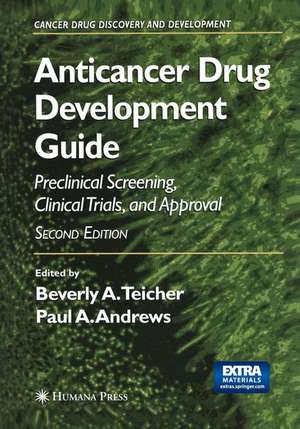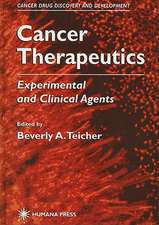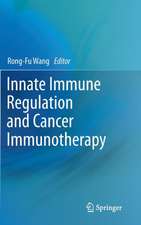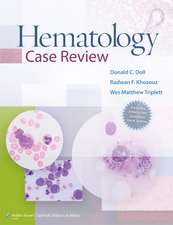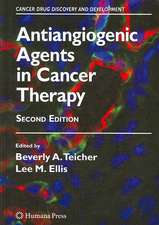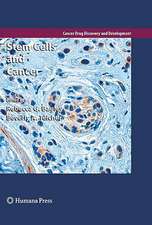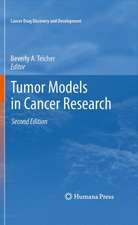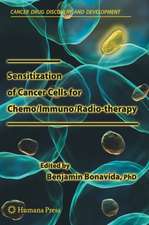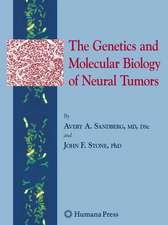Anticancer Drug Development Guide: Preclinical Screening, Clinical Trials, and Approval: Cancer Drug Discovery and Development
Editat de Beverly A. Teicher, Paul A. Andrewsen Limba Engleză Paperback – 8 aug 2012
| Toate formatele și edițiile | Preț | Express |
|---|---|---|
| Paperback (1) | 1109.80 lei 6-8 săpt. | |
| Humana Press Inc. – 8 aug 2012 | 1109.80 lei 6-8 săpt. | |
| Hardback (1) | 1433.10 lei 6-8 săpt. | |
| Humana Press Inc. – feb 2004 | 1433.10 lei 6-8 săpt. |
Din seria Cancer Drug Discovery and Development
- 5%
 Preț: 1474.98 lei
Preț: 1474.98 lei - 5%
 Preț: 1108.35 lei
Preț: 1108.35 lei - 5%
 Preț: 1415.75 lei
Preț: 1415.75 lei - 5%
 Preț: 1370.19 lei
Preț: 1370.19 lei - 5%
 Preț: 1452.28 lei
Preț: 1452.28 lei - 5%
 Preț: 1316.74 lei
Preț: 1316.74 lei - 5%
 Preț: 1439.50 lei
Preț: 1439.50 lei - 5%
 Preț: 1113.63 lei
Preț: 1113.63 lei - 5%
 Preț: 1126.24 lei
Preț: 1126.24 lei - 24%
 Preț: 1037.59 lei
Preț: 1037.59 lei - 5%
 Preț: 1466.37 lei
Preț: 1466.37 lei - 5%
 Preț: 1350.78 lei
Preț: 1350.78 lei - 5%
 Preț: 1417.54 lei
Preț: 1417.54 lei - 5%
 Preț: 1113.46 lei
Preț: 1113.46 lei - 5%
 Preț: 1428.54 lei
Preț: 1428.54 lei - 5%
 Preț: 1429.80 lei
Preț: 1429.80 lei - 5%
 Preț: 782.10 lei
Preț: 782.10 lei - 5%
 Preț: 1438.58 lei
Preț: 1438.58 lei - 5%
 Preț: 1110.32 lei
Preț: 1110.32 lei - 5%
 Preț: 1434.39 lei
Preț: 1434.39 lei - 5%
 Preț: 1365.82 lei
Preț: 1365.82 lei - 5%
 Preț: 1461.08 lei
Preț: 1461.08 lei - 5%
 Preț: 1106.86 lei
Preț: 1106.86 lei - 5%
 Preț: 982.18 lei
Preț: 982.18 lei - 5%
 Preț: 727.80 lei
Preț: 727.80 lei - 5%
 Preț: 1331.76 lei
Preț: 1331.76 lei - 5%
 Preț: 1297.40 lei
Preț: 1297.40 lei - 5%
 Preț: 1124.59 lei
Preț: 1124.59 lei - 5%
 Preț: 1433.10 lei
Preț: 1433.10 lei - 5%
 Preț: 1110.90 lei
Preț: 1110.90 lei - 5%
 Preț: 1317.76 lei
Preț: 1317.76 lei - 5%
 Preț: 1464.91 lei
Preț: 1464.91 lei - 5%
 Preț: 1939.63 lei
Preț: 1939.63 lei - 5%
 Preț: 1418.48 lei
Preț: 1418.48 lei - 5%
 Preț: 1438.94 lei
Preț: 1438.94 lei - 5%
 Preț: 1100.30 lei
Preț: 1100.30 lei - 5%
 Preț: 1109.96 lei
Preț: 1109.96 lei - 5%
 Preț: 990.58 lei
Preț: 990.58 lei - 5%
 Preț: 1443.13 lei
Preț: 1443.13 lei - 5%
 Preț: 1428.91 lei
Preț: 1428.91 lei - 5%
 Preț: 787.58 lei
Preț: 787.58 lei - 5%
 Preț: 1311.72 lei
Preț: 1311.72 lei - 5%
 Preț: 1331.76 lei
Preț: 1331.76 lei - 5%
 Preț: 1113.11 lei
Preț: 1113.11 lei - 5%
 Preț: 1440.76 lei
Preț: 1440.76 lei
Preț: 1109.80 lei
Preț vechi: 1168.21 lei
-5% Nou
Puncte Express: 1665
Preț estimativ în valută:
212.36€ • 219.08$ • 177.22£
212.36€ • 219.08$ • 177.22£
Carte tipărită la comandă
Livrare economică 26 martie-09 aprilie
Preluare comenzi: 021 569.72.76
Specificații
ISBN-13: 9781468498417
ISBN-10: 146849841X
Pagini: 465
Ilustrații: XIV, 451 p. 161 illus.
Dimensiuni: 178 x 254 x 25 mm
Greutate: 0.8 kg
Ediția:Softcover reprint of the original 1st ed. 2004
Editura: Humana Press Inc.
Colecția Humana
Seria Cancer Drug Discovery and Development
Locul publicării:Totowa, NJ, United States
ISBN-10: 146849841X
Pagini: 465
Ilustrații: XIV, 451 p. 161 illus.
Dimensiuni: 178 x 254 x 25 mm
Greutate: 0.8 kg
Ediția:Softcover reprint of the original 1st ed. 2004
Editura: Humana Press Inc.
Colecția Humana
Seria Cancer Drug Discovery and Development
Locul publicării:Totowa, NJ, United States
Public țintă
ResearchCuprins
I: In Vitro Methods.- 1 High-Volume Screening.- 2 High-Throughput Screening in Industry.- 3 The NCI Human Tumor Cell Line (60-Cell) Screen: Concept, Implementation, and Applications.- 4 Human Tumor Screening.- II: In Vivo Methods.- 5 Murine L1210 and P388 Leukemias.- 6 In Vivo Methods for Screening and Preclinical Testing: Use of Rodent Solid Tumors for Drug Discovery.- 7 Human Tumor Xenograft Models in NCI Drug Development.- 8 NCI Specialized Procedures in Preclinical Drug Evaluations.- 9 Patient-Like Orthotopic Metastatic Models of Human Cancer.- 10 Preclinical Models for Combination Therapy.- 11 Models for Biomarkers and Minimal Residual Tumor.- 12 Spontaneously Occurring Tumors in Companion Animals As Models for Drug Development.- III: Nonclinical Testing to Support Human Trials.- 13 Nonclinical Testing: From Theory to Practice.- 14 Nonclinical Testing for Oncology Drug Products.- 15 Nonclinical Testing for Oncology Biologic Products.- IV: Clinical Testing.- 16 Working With the National Cancer Institute.- 17 Phase I Trial Design and Methodology for Anticancer Drugs.- 18 Phase II Trials: Conventional Design and Novel Strategies in the Era of Targeted Therapies.- 19 Drug Development in Europe: The Academic Perspective.- 20 The Phase III Clinical Cancer Trial.- 21 Assessing Tumor-Related Symptoms and Health-Related Quality of Life in Cancer Clinical Trials: A Regulatory Perspective.- 22 The Role of the Oncology Drug Advisory Committee in the FDA Review Process for Oncologic Products.- 23 FDA Role in Cancer Drug Development and Requirements for Approval.
Recenzii
From Reviews of the First Edition:
"...traces the critically important pathway by which a 'molecule' becomes an 'an anticancer agent'."
-Unlisted Drugs
"...this book is a must for all oncology fellows and junior faculty interested in drug development and will be a welcome addition on the bookshelf of all oncologists, pharmacists and other professionals interested in understanding this complex area." -Journal of Clinical Oncology
"...traces the critically important pathway by which a 'molecule' becomes an 'an anticancer agent'."
-Unlisted Drugs
"...this book is a must for all oncology fellows and junior faculty interested in drug development and will be a welcome addition on the bookshelf of all oncologists, pharmacists and other professionals interested in understanding this complex area." -Journal of Clinical Oncology
Textul de pe ultima copertă
In this thoroughly updated and expanded second edition of Beverly Teicher's widely used classic survey, Anticancer Drug Development Guide: Preclinical Screening, Clinical Trials, and Approval, leading cancer researchers from pharmaceutical companies, government laboratories, and academia provide a step-by-step guide to anticancer drug development from initial design through FDA approval. The authors have included new material on the use of high-throughput screening in industry, on specialized in vitro/in vivo procedures employed by the National Cancer Institute (NCI) in preclinical drug evaluations, and on nonclinical testing to support both human clinical trials, as well as trials of biologic oncology products. There are also new chapters on health-related quality of life (HRQL) issues in cancer clinical trials, and FDA review and requirements for approval of oncologic products. The chapters on phase I, II, and III clinical trials and on novel phase II clinical trial designs for targeted therapies have been significantly updated, along with those on cancer drug development in Europe, on working with the NCI, as well as on the FDA's role in cancer drug development and in setting requirements for approval.
Authoritative and up-to-date, Anticancer Drug Development Guide: Preclinical Screening, Clinical Trials, and Approval takes oncologists, pharmacologists, medicinal chemists, and other cancer researchers on an encyclopedic tour of the cancer drug development and approval process, moving from the design and execution of high-throughput screens, to preclinical testing, to safety and toxicity testing under FDA requirements, to early clinical trials, and on to final FDA approval.
Authoritative and up-to-date, Anticancer Drug Development Guide: Preclinical Screening, Clinical Trials, and Approval takes oncologists, pharmacologists, medicinal chemists, and other cancer researchers on an encyclopedic tour of the cancer drug development and approval process, moving from the design and execution of high-throughput screens, to preclinical testing, to safety and toxicity testing under FDA requirements, to early clinical trials, and on to final FDA approval.
Caracteristici
Includes supplementary material: sn.pub/extras
